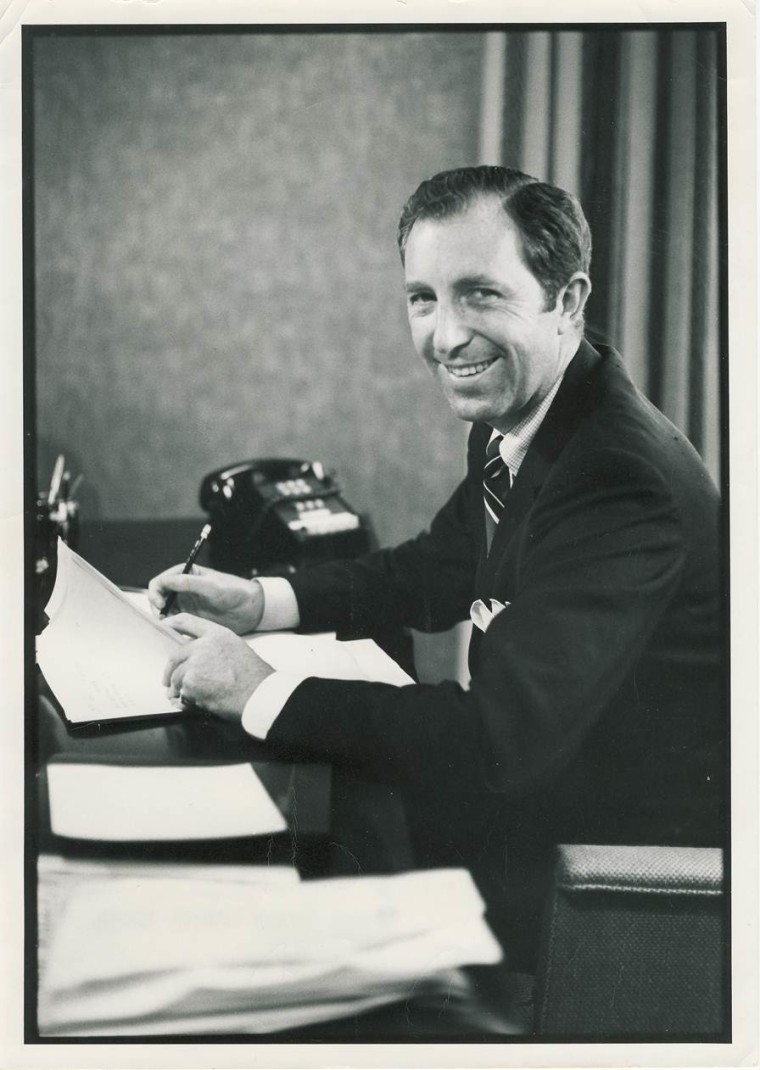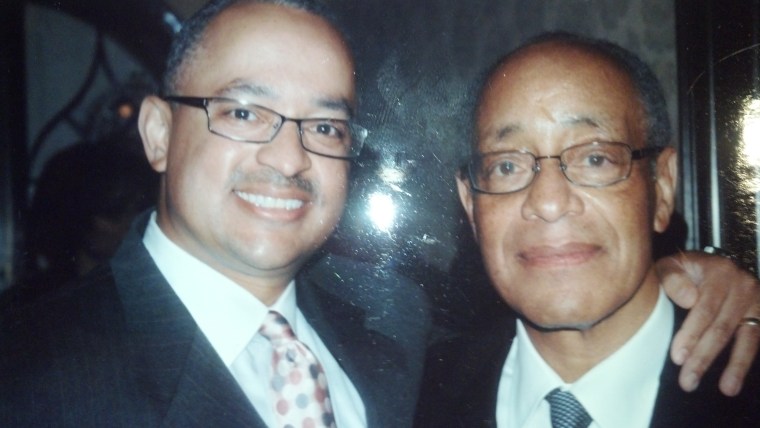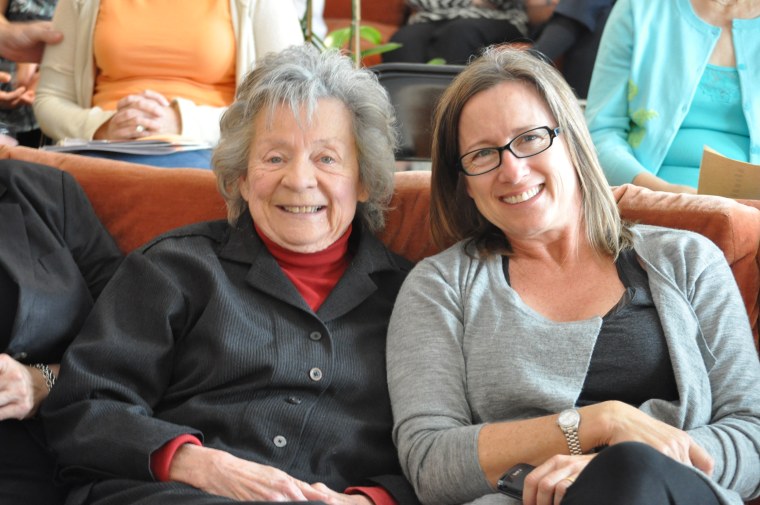NBC News collected stories of activists who have devoted their lives to raising awareness about Alzheimer's disease. Share your own stories on Twitter, Facebook or Google+ using the hashtag #AgeofAlz.
Elizabeth Gelfand Stearns: Helping to lead the future of Alzheimer's survivorship
How has Alzheimer’s disease had the greatest impact on your life?
I am the face of Alzheimer's disease and I am working to change the plan for my generation and all generations to come. My grandmother, Gertrude Jaffe and my mother, Judy Gelfand, both died of Alzheimer's disease in their 70s. Our family established The Judy Fund in 2003. To-date we have raised and granted just under $5 million to support Alzheimer's research and public policy in partnership with the Alzheimer's Association. I chair The Judy Fund and I am a member of the national Board of Directors of the Alzheimer's Association. I also partner with Maria Shriver to advance public awareness and engagement with the goal of changing the face of this disease.
The disease has had enormous impact on my life: through love, deep loss, and singular determination, I transitioned my professional career to work alongside national advocates to change the trajectory of this disease. My plan is to help lead the future of Alzheimer's survivorship.
What is the one thing about the disease you think people should know that they may not be aware of?
Alzheimer's disease is everyone's problem. The median age of Alzheimer's is 72, but science tells us that that beta amyloid and tau tangles start to build in your brain 10-15 years prior to memory loss. 60 million boomers are entering their Alzheimer's years; one in seven has the disease in their brains and they don't know it.
The cost of caring for people with Alzheimer's disease has topped $200 billion annually, making it the most expensive disease our country has to care for each year. Alzheimer's is ranked 6 on the list of the top 10 causes of death in this country, yet it remains the only fatal killer on the list with no disease-modifying drugs or cure.
Our federal government and the NIH invests just over $500 million annually on research, but this disease is costing taxpayers and our country $200 billion annually. That's what I want everyone to know.
Elizabeth Gelfand Stearns is Chair of the Judy Fund and a member of the National Board of Directors of the Alzheimer’s Association.
Mikey Hoag: If we don't spend to find a cure, there will be enormous consequences to society

How has Alzheimer’s disease had the greatest impact on your life?
The slow, torturous loss of my father to the disease was the greatest impact on my life. I watched my Dad, a long time finance veteran who was proud that his intelligence and hard work gave his family a more prosperous life, turn into a helpless shell of a man. For the last decade of his life he was unable to care for himself, which created an enormous burden on the family.
What is the one thing about the disease that you think people should know that they may not be aware of?
That our government spends $203 billion a year on Alzheimer’s patients and that amount will rise to $1.2 trillion by 2050. Based upon the volume of baby boomers coming down the pipe, and the skyrocketing cost of care for the aging, this disease will likely soon literally bankrupt Medicare and Medicaid, if unchecked. I am shocked and surprised that the NIH only spends approximately $500 million on research to stop this disease. If we don’t spend to find a cure, there will be enormous consequences to society.
Mikey Hoag lost her father to Alzheimer’s more than five years ago. She is founder of “Part the Cloud,” an Alzheimer’s fundraising organization based in Silicon Valley, California. More information can be found at http://www.alz.org/partthecloud/overview.asp.
Lou Holland: A true game changer
How has Alzheimer’s disease had the greatest impact on your life?
Because my family has this link to the disease, through generations, I've realized more and more how precious life truly is and that you have to spend time with the ones you love today, not tomorrow! As when this disease takes hold, that person is no longer there. There physical form is there, but the essence of who they were are not. So, how has this disease changed me, I realized what is truly most important in life and that which is not!

What is the one thing about the disease you think people should know that they may not be aware of?
That this disease is a true game changer on many levels! The fact that there is no cure currently for the disease, so when it comes it comes and it reacts differently with each person. It's a game changer as far as costs! My family pays $8000 a month for my father to be cared for in a facility, that is clean, gives him 3 meals a day, and room. That is $96,000 per year net dollar costs! Its a game changer financially big time! Its a game changer emotionally and the toll it takes on the care giver, no matter how bad the other diseases are, none of them has this type of emotional toll on the caregiver. The disease history in my family has been 15 to 20 years where they know no one, not even friends, or loved ones, or family. So, people should know that this is a true game changer!
Lou’s family is committed to funding Alzheimer’s research through the Holland Wisconsin Alzheimer's Institute Research Fund at the University of Wisconsin, where Lou and his father and grandfather played Big 10 football. His father, aunt, and grandmother both had Alzheimer’s. Lou is also a National Board member of the Alzheimer’s Association.
Susan Disney Lord: 3 things to remember about Alzheimer's
How has Alzheimer's disease had the greatest impact on your life?

I watched my mother waste away and die from AD, something I hope to never endure again. And it's something I pray won't happen to me and that my children won't have to go through. I watched AD take a brilliant, funny, charming woman and turn her into a dribbling, babbling, childlike being, with no ability to connect with those she loved. We always kept a sense of humor about Mom's condition, and she did have the ability to enjoy herself a little bit, an occasional smile. But mostly my Mom was confused and scared because she couldn't understand what was going on around her. This happened over the course of six years, from diagnosis until her death. I consider us lucky, some people suffer through it for up to 20 years. I can't imagine.
What is the one thing about the disease you think people should know that they may not be aware of?
I can't drill down to one single point so I will give you three:
- People at large don't really know that this is a terminal disease, everyone who gets it dies.
- This an epidemic!
- We need government funded research NOW or this disease alone will wipe out our economy in probably less than 30 years' time. If people don't start having compassion for those afflicted, that’s fine, I don't care. If people don't realize it could happen to someone in their own family at any time, okay. When people realize that our entire social structure and economic viability will be affected within 30 years, maybe they'll start paying attention. If that kind of fear is what gets this process moving, I can live with that, as long as we get some treatment/cure for Alzheimer's disease!
Susan Disney Lord’s mother was diagnosed with Alzheimer’s at the age of 72. She lost her mother five years later.